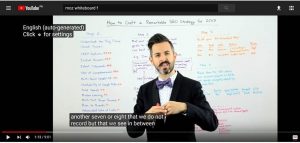A traditional résumé, by itself, is quite unlikely to get you noticed in 2016.
This is the main reason you need to move on – to personal brands, digital content strategies and paid social media campaigns – if you want to remain competitive in the modern job market.
Yep: 2015 was the year traditional résumé writing died .. or, at the very least, the year it became clear to me that professional résumé writing, at least in the way we’ve defined it for the past few decades, is not a service that can help you during job search in 2016.
As standalone job search tools, résumés have exhausted their limits. The emerging combination of digital technologies and future of work trends are rapidly changing the way people look for and find work, and highlight the need for a broader approach to job search.
Here are 4 reasons why you shouldn’t hire a professional résumé writer – and hire a professional of a different calibre instead.
1. Not All Jobs Are Advertised.
Résumés emerged as an answer to a Jobsearch 1.0 world. In this world, the job search process looked somewhat like this:
You found an advertised position => you emailed your résumé => you waited for a call back.
The thing is, we’re no longer in Jobsearch 1.0 world. Heck, we’re not even in Jobsearch 2.0 anymore, which is centered around using a basic digital presence, such as LinkedIn, to advance your career.
According to this Forbes article, up to 80% of hires are made without advertising the position. While that percentage seems exaggerated to me, it’s true that personal relationships, networking, and demonstrated expertise via a strategic online presence will blow even the best résumés out of the water.
2. A Résumé Is No Longer Enough To Get You A Call Back.
Even if you manage to lob your résumé directly into a Hiring Manager’s inbox, and they actually open it, they’re not going to give you a call based on your résumé alone.
Nope, they’re going to look you up online, immediately Googling your name or checking out your LinkedIn profile.
The fact is, Hiring Managers and Recruiters don’t want to have to read your résumé in order to form an opinion about you, or make their decision: they want to get a real picture of who you are, and the value you can add.
That’s why a whopping 77% of recruiters say they look up candidates online, using what they find as the basis to start a conversation.
“[I] primarily read the résumé to prepare for our initial dialogue and use it as a framework during the call,” writes Dave Fecak, blogger at Job Tips for Geeks. But, he adds, seeing something beyond the résumé, even if it’s just a few sentences, is key to making him want to have that talk.
Job seekers today need to shift their job search paradigm: job search is no longer a process of winding work; it’s about starting a conversation.
Your challenge is to give a recruiter, hiring manager, or client a reason to start that conversation, and a résumé isn’t necessarily the best tool to do that.
3. Online Reach And Credibility Matter More And More.
Last year, I was trying to figure out how to fix Google Analytics on my website, and I of course went straight to Google to find the answer.
A blog post came up near the top of the search results and, after reading it, I really liked how the author approached the problem. Instead of fixing the issue myself, I hired him – for that job, and for many other jobs since.
And it’s not just me who hires this way.
Cheryl Howard, a long-time Scrum Master and Project Manager based in Berlin, transitioned from software project management to a full-time career as a marketing writer based on the strength of her blog, Cherylhoward.com.
“I think the company was much more comfortable hiring me because of my online presence. They were able to see who I am and what I can do, and they liked that I know SEO, blogging and social media. I was less of a risk, because I had already demonstrated I have the skills needed to succeed as a content writer.”
The people that seem to be using this strategy most effectively today are the people that work in digital and marketing, but that doesn’t mean it can’t work for others.
On the contrary, a massive opportunity exists for job seekers across all industries to use a strong blog and social media strategy as a highly effective channel for getting noticed by employers, without ever writing a résumé.
Sign 4: Résumé Writing Has A Quality Problem.
The truth is, free résumé building apps are pretty bad, but they’re almost as good as the average résumé writer.
Barriers-to-entry to becoming a “professional” résumé writer are pretty much non-existent, beyond the cost of a website, computer and some basic marketing.
After building a successful business in which my bread and butter has indeed been résumé writing, I’ve come to realise my insistence on writing résumés that showcase commercial acumen, a well-defined brand and USP, and incorporate web-ready design, is the exception, not the rule.
Writing a great professional résumé requires more than keyword stuffing and listing achievements to be successful.
It requires you include information hiring managers actually want to see: your role mandate, and how you achieved it; a clear link between your duties and commercial results; and a powerful story that weaves together your experience, achievements, and professional personality.
Simply put, most résumé writers aren’t operating at that level.
The fact that most résumé writers don’t understand HR and recruitment from a senior level, lack experience with top-tier companies, and can’t view your career through the same lens as the people you’re targeting in your job search is another nail in the résumé writing coffin.
Résumé Writing Is Dead – Long Live Personal Brand Management.
At least for the foreseeable future, I can’t imagine a world where recruiters and hiring managers aren’t going to want to at least glance at your qualifications, tenure, career progression, and duties and accomplishments, which are, admittedly, rather effectively communicated via a well-written résumé.
But communicating dry facts and figures is no longer enough; just like companies, candidates today need to create simple, intelligent, integrated and highly potent ecosystems of information about themselves.
And in navigating the transition from transaction-based résumés to online conversations and engagements, we’re going to see the rise of personal brand managers.
Personal brand management goes far beyond writing achievements.
Its a process which begins with articulating your value and then disseminating your key messages across your LinkedIn, executive website and blog, résumé, social media profiles, and more.
Personal brand managers will help candidates move from the linear approach to Jobsearch 1.0 to omni-channel Jobsearch 3.0, which is concurrently both active and passive and involves your:
- social media channels
- personal website
- SEO-optimised content
- online comments, and
- business portraiture
All of those elements are built to inform and create engagement opportunities with your personal brand and, of course, your résumé is also very much part of that mix. However a résumé alone, written by a “professional” resume writer, is next to useless in 2016 onwards.
Business & Finance Articles on Business 2 Community(38)
Report Post



